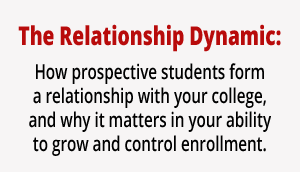I recently asked an admissions counselor this question: “What if every time you picked up the phone to call a prospective student you knew that you were going to have a meaningful and productive conversation?” After thinking about that for a moment, he stunned me with his answer. “That,” he said, “would be life-changing.” This veteran counselor explained that he often found calls to students frustrating and ineffective. “I love interacting with students, yet I find myself dreading those calls because I don’t feel like I really accomplish anything,” he said.
College bound students who have participated in our co-sponsored studies share some of the same frustrations. Clearly, there appears to be a disconnection between students and counselors when talking by phone. There is a fix, though – something that can make the conversation richer and more helpful for both the student and counselor. The key lies in an interruption of the pattern that is commonly practiced by counselors and expected by students.
In a recent co-sponsored study we conducted for participating colleges about communicating with prospective students, we asked students to tell us which methods they find most and least helpful in how colleges communicate with them. That survey question, by the way, was open-ended to elicit the qualitative insight that proves so valuable.
So, what did we find?
We recorded a large number of students who said telephone calls from admissions counselors were among the “most helpful” methods that colleges use to communicate with them. We recorded an equal number who said it was among the “least helpful” methods. What gives? You could speculate that there are simply some students who prefer phone calls and others who don’t. A review of the qualitative data suggests something different.
Here is a sampling of responses from students who say phone calls are among the LEAST helpful methods:
- “I can’t remember everything they tell me.”
- “It gets overwhelming.”
- “I can’t comprehend everything they say about their college.”
- “Unless I ask for more information, the call gets really boring.”
Here is a sampling of responses from students who say phone calls are among the MOST helpful methods:
- “I like telephone calls because you can ask questions.”
- “I can get out what I need and ask questions.”
- “Phone calls allow me to ask my own questions and make the experience more personalized.”
- “Personal calls because you can ask questions.”
See the difference? During the ineffective calls, the information flow is clearly college-to-student. Many admissions counselors have been conditioned to communicate ALL of the features and benefits of the institution in every phone call. During the effective calls, on the other hand, the flow is clearly student-to-college. Students ask questions. And they ask questions. And they ask more questions. Asking questions means they are intellectually and emotionally involved in the conversation. That level of involvement gives you a great chance of building a bond that will lead to enrollment.
When Longmire and Company visits campuses to conduct Interactive Training Workshops for counselors, we focus on the tools and techniques that counselors must use to put students in a frame of mind to open up and ask questions. This includes proper use of close-end and open-end questioning, as well as asking open-minded questions that spark dialogue from otherwise non-verbal prospects.
I can guarantee one thing. A prospective student will engage, comprehend and remember any conversation that hits them at an emotional level. That’s the goal. Every conversation should be measured on that basis.
Because it’s connected with the topic of this post, you should know that we are launching a new higher education study (the latest is a very popular series) in which we will explore, in detail, how students form a relationship (or not) with the colleges they consider. It’s called, The Relationship Dynamic: How prospective students form a relationship with your college, and why it matters in your ability to grow and control enrollment. You can get insight into how effectively you are building (or not building) relationships that will lead to enrollment.
Continue the conversation on Twitter @LongmireCo. Be sure to Subscribe to Versions of Conversion today so you don’t miss any of this highly-valuable information.
 Rick Montgomery is as an Enrollment Strategist at Longmire and Company. With over 20 years in higher education marketing, he brings an innovative approach to helping colleges and universities meet their enrollment goals. Rick can be reached at 913/492.1265 x.708 or via email at rmontgomery@longmire-co.com.
Rick Montgomery is as an Enrollment Strategist at Longmire and Company. With over 20 years in higher education marketing, he brings an innovative approach to helping colleges and universities meet their enrollment goals. Rick can be reached at 913/492.1265 x.708 or via email at rmontgomery@longmire-co.com.

